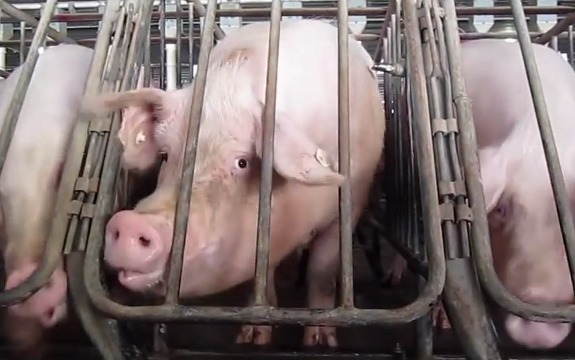Tyson: Big Ag Corp. Practicing Animal Cruelty Calls for More Space for Animals

 If you aren’t aware that your morning bacon was made from a pig grown in a gestation crate that barely gives an animal the ability turn over, let alone roam freely on the green earth, then you probably didn’t know that Tyson Foods is one of the few remaining meat processors who have clung to this abhorrent trend. Due to activism from several animal protection groups, Tyson might not be able to compete in the market place without changing that habit.
If you aren’t aware that your morning bacon was made from a pig grown in a gestation crate that barely gives an animal the ability turn over, let alone roam freely on the green earth, then you probably didn’t know that Tyson Foods is one of the few remaining meat processors who have clung to this abhorrent trend. Due to activism from several animal protection groups, Tyson might not be able to compete in the market place without changing that habit.
The U.S. Humane Society describes gestation crates as ‘barely two feet wide. . . so small that animals can’t take a step forward or backward.’ After activist groups learned of the practice several years back, even the US Secretary of Agriculture agreed that it should be phased out.
Safeway, a food retailer, decided this past December that it would start to purchase its pork from suppliers who used group housing systems instead of gestation crates. They, among 60 other retailers, have followed the suggestion of activists to give animals more room, even if they are meant for slaughter.
Recently, Green Century Capital Management, the Humane Society, and the United Methodist Church Benefit Board submitted a resolution to Tyson’s annual general meeting for shareholders asking that they report on their reasons for carrying on with the use of gestational crates. The groups pointed out to Tyson that they risked both financial and reputational damage by continuing to put their animals in such cramped spaces.
Read: ‘Ag-Gag’ Laws to Criminalize Activists Exposing Animal Cruelty
The resolution was effective since Tyson Foods wrote its suppliers “should allow sows of all sizes to stand, turn around, lie down and stretch their legs.”
“We’re asking the contract farmers who manage Tyson-owned sows to implement improved ‘quality and quantity of space’ standards in the design of any newly built or redesigned gestation barns beginning in 2014,” the letter continued. “We also strongly encourage the hog farmers who sell market hogs to Tyson to improve quantity and quality of space standards for sows when they or their piglet suppliers re-design or build new gestation barns.”
“Gestation crates are a cruel and highly controversial part of an industrial meat production system that threatens water supplies, creates air pollution and contributes to global warming,” says Leslie Samuelrich, president of Green Century.
As more businesses realize the power of reputation-branding, perhaps we will see Big Ag and Biotech change their tune. For now, at least a piglet can grow up in a barn instead of a jail and those who would practice animal cruelty will get just what they deserve.
